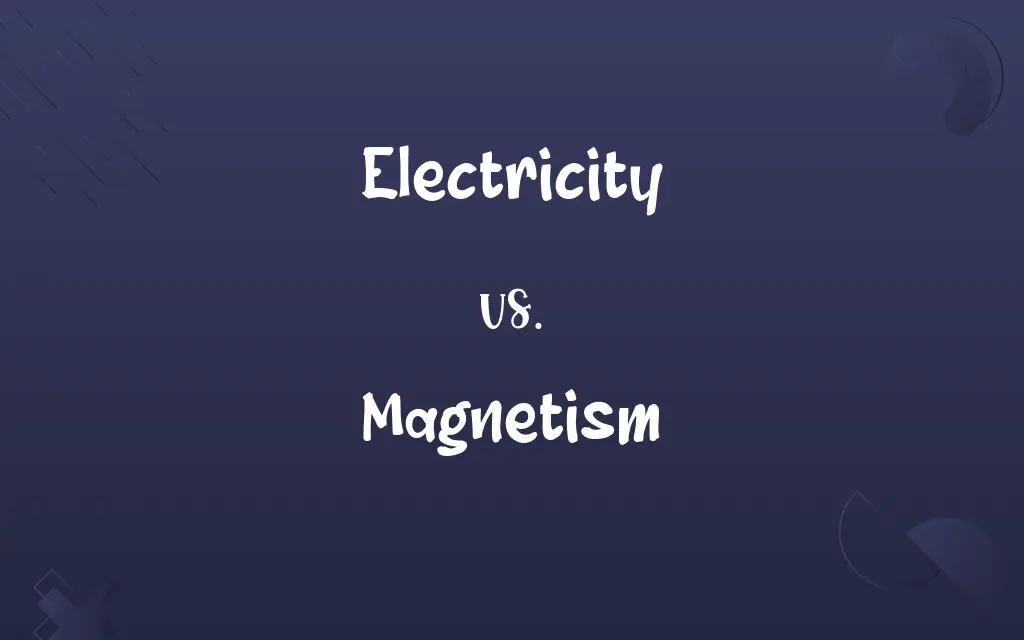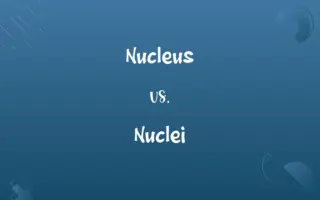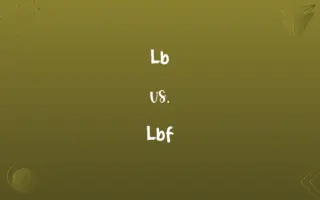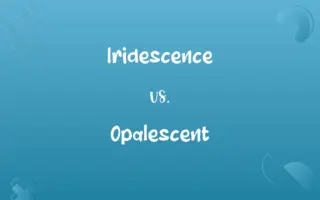Electricity vs. Magnetism: Know the Difference

By Shumaila Saeed || Updated on December 25, 2023
Electricity is the movement of electrons creating an electric charge, whereas magnetism is the force exerted by magnets when they attract or repel each other.

Key Differences
Electricity involves the flow of electrons, creating an electric current used in power systems, while magnetism is a property of materials that respond to an applied magnetic field, often utilized in compasses and hard drives.
Shumaila Saeed
Nov 15, 2023
Electricity can be static or dynamic (current), evident in phenomena like lightning or powering devices, whereas magnetism arises from the motion of electric charges, visible in permanent magnets or electromagnets.
Shumaila Saeed
Nov 15, 2023
Electricity's fundamental unit is the ampere, measuring current flow, while magnetism's key measure is the tesla, indicating magnetic field strength.
Shumaila Saeed
Nov 15, 2023
Electricity's effects include heating, lighting, and running motors, whereas magnetism's influence is seen in magnetic force and direction, crucial in navigation and data storage.
Shumaila Saeed
Nov 15, 2023
In electricity, conductors and insulators play key roles in controlling electron flow, while in magnetism, ferromagnetic materials like iron and nickel are significant for their strong magnetic properties.
Shumaila Saeed
Nov 15, 2023
ADVERTISEMENT
Comparison Chart
Units of Measurement
Amperes (current), Volts (potential difference)
Tesla (magnetic field strength)
Shumaila Saeed
Nov 15, 2023
Typical Applications
Powering devices, lighting, heating
Navigation, data storage, motors
Shumaila Saeed
Nov 15, 2023
Key Materials
Conductors like copper, insulators like rubber
Ferromagnetic materials like iron, nickel
Shumaila Saeed
Nov 15, 2023
ADVERTISEMENT
Electricity and Magnetism Definitions
Electricity
Electricity is a form of energy resulting from the existence of charged particles.
Electricity is generated at power stations for city-wide distribution.
Shumaila Saeed
Nov 15, 2023
Magnetism
Magnetism is the branch of science that deals with magnetic fields and their effects.
Magnetism is studied to understand how electromagnets work.
Shumaila Saeed
Nov 15, 2023
Electricity
Electricity is the physical phenomenon associated with stationary or moving electrons and protons.
Static electricity causes a shock when you touch a metal doorknob.
Shumaila Saeed
Nov 15, 2023
Magnetism
Magnetism is the force exerted by magnets when they attract or repel each other.
Magnetism enables the compass needle to always point north.
Shumaila Saeed
Nov 15, 2023
Electricity
Electricity is a secondary energy source, generated by the conversion of primary sources of energy.
Hydroelectric plants convert water energy into electricity.
Shumaila Saeed
Nov 15, 2023
ADVERTISEMENT
Magnetism
Magnetism is a fundamental force that is mediated by magnetic fields.
Earth's magnetism is crucial for navigation using a compass.
Shumaila Saeed
Nov 15, 2023
Electricity
Electricity is the presence and flow of electric charge.
The electricity powers the lights in our homes.
Shumaila Saeed
Nov 15, 2023
Magnetism
Magnetism is a physical phenomenon produced by the motion of electric charge, resulting in attractive and repulsive forces.
The magnetism of a fridge magnet holds notes on the refrigerator door.
Shumaila Saeed
Nov 15, 2023
Electricity
Electricity is used to describe the energy produced when electrons are moved.
Electricity fuels the operation of various household appliances.
Shumaila Saeed
Nov 15, 2023
Electricity
The physical phenomena arising from the behavior of electrons and protons that is caused by the attraction of particles with opposite charges and the repulsion of particles with the same charge.
Shumaila Saeed
Oct 19, 2023
Magnetism
Unusual power to attract, fascinate, or influence
The magnetism of money.
Shumaila Saeed
Oct 19, 2023
Electricity
Originally, a property of amber and certain other nonconducting substances to attract lightweight material when rubbed, or the cause of this property; now understood to be a phenomenon caused by the distribution and movement of charged subatomic particles and their interaction with the electromagnetic field.
Shumaila Saeed
Oct 19, 2023
Electricity
(physics) The study of electrical phenomena; the branch of science dealing with such phenomena.
Shumaila Saeed
Oct 19, 2023
Electricity
A feeling of excitement; a thrill.
Opening night for the new production had an electricity unlike other openings.
Shumaila Saeed
Oct 19, 2023
Magnetism
Power of attraction; power to excite the feelings and to gain the affections.
Shumaila Saeed
Oct 19, 2023
Electricity
Electric power/energy as used in homes etc., supplied by power stations or generators.
Shumaila Saeed
Oct 19, 2023
Electricity
A property of certain of the fundamental particles of which matter is composed, called also electric charge, and being of two types, designated positive and negative; the property of electric charge on a particle or physical body creates a force field which affects other particles or bodies possessing electric charge; positive charges create a repulsive force between them, and negative charges also create a repulsive force. A positively charged body and a negatively charged body will create an attractive force between them. The unit of electrical charge is the coulomb, and the intensity of the force field at any point is measured in volts.
Shumaila Saeed
Oct 19, 2023
Magnetism
The property, quality, or state, of being magnetic; the manifestation of the force in nature which is seen in a magnet. At one time it was believed to be separate from the electrical force, but it is now known to be intimately associated with electricity, as part of the phenomenon of electromagnetism.
Shumaila Saeed
Oct 19, 2023
Electricity
Any of several phenomena associated with the accumulation or movement of electrically charged particles within material bodies, classified as static electricity and electric current. Static electricity is often observed in everyday life, when it causes certain materials to cling together; when sufficient static charge is accumulated, an electric current may pass through the air between two charged bodies, and is observed as a visible spark; when the spark passes from a human body to another object it may be felt as a mild to strong painful sensation. Electricity in the form of electric current is put to many practical uses in electrical and electronic devices. Lightning is also known to be a form of electric current passing between clouds and the ground, or between two clouds. Electric currents may produce heat, light, concussion, and often chemical changes when passed between objects or through any imperfectly conducting substance or space. Accumulation of electrical charge or generation of a voltage differnce between two parts of a complex object may be caused by any of a variety of disturbances of molecular equilibrium, whether from a chemical, physical, or mechanical, cause. Electric current in metals and most other solid coductors is carried by the movement of electrons from one part of the metal to another. In ionic solutions and in semiconductors, other types of movement of charged particles may be responsible for the observed electrical current.
Shumaila Saeed
Oct 19, 2023
Electricity
The science which studies the phenomena and laws of electricity; electrical science.
Shumaila Saeed
Oct 19, 2023
Magnetism
Power of attraction; power to excite the feelings and to gain the affections.
Shumaila Saeed
Oct 19, 2023
Electricity
Fig.: excitement, anticipation, or emotional tension, usually caused by the occurrence or expectation of something unusual or important.
Shumaila Saeed
Oct 19, 2023
Magnetism
Attraction for iron; associated with electric currents as well as magnets; characterized by fields of force
Shumaila Saeed
Oct 19, 2023
Electricity
A physical phenomenon associated with stationary or moving electrons and protons
Shumaila Saeed
Oct 19, 2023
Electricity
Energy made available by the flow of electric charge through a conductor;
They built a car that runs on electricity
Shumaila Saeed
Oct 19, 2023
Magnetism
Magnetism is an attribute of materials that respond to an applied magnetic field.
The magnetism of iron filings aligns them along magnetic field lines.
Shumaila Saeed
Nov 15, 2023
Electricity
Keen and shared excitement;
The stage crackled with electricity whenever she was on it
Shumaila Saeed
Oct 19, 2023
Repeatedly Asked Queries
What are insulators in terms of electricity?
Insulators are materials that resist the flow of electric current, like rubber or glass.
Shumaila Saeed
Nov 15, 2023
How is electricity generated?
Electricity is generated by converting other forms of energy like kinetic or thermal energy into electrical energy.
Shumaila Saeed
Nov 15, 2023
What is electricity?
Electricity is the flow of electric charge, typically through conductive materials.
Shumaila Saeed
Nov 15, 2023
What's the difference between AC and DC electricity?
AC (alternating current) electricity changes direction periodically, while DC (direct current) flows in one direction.
Shumaila Saeed
Nov 15, 2023
What are common uses of electricity?
Common uses include powering devices, lighting, and heating.
Shumaila Saeed
Nov 15, 2023
How is magnetism created?
Magnetism is created by the movement of electric charges or the alignment of atoms in certain materials.
Shumaila Saeed
Nov 15, 2023
What is a magnetic field?
A magnetic field is the area around a magnet where magnetic forces can be observed.
Shumaila Saeed
Nov 15, 2023
What is magnetism?
Magnetism is the force exerted by magnets, causing attraction or repulsion of other magnetic materials.
Shumaila Saeed
Nov 15, 2023
What is an electromagnet?
An electromagnet is a type of magnet where the magnetic field is produced by an electric current.
Shumaila Saeed
Nov 15, 2023
What materials are strongly magnetic?
Iron, nickel, and cobalt are strongly magnetic materials.
Shumaila Saeed
Nov 15, 2023
What is a solenoid?
A solenoid is a coil of wire that generates a magnetic field when an electric current passes through it.
Shumaila Saeed
Nov 15, 2023
What are common uses of magnetism?
Common uses include in compasses, motors, and data storage devices.
Shumaila Saeed
Nov 15, 2023
How does electricity create magnetism?
When electric current flows, it creates a magnetic field around it, thus generating magnetism.
Shumaila Saeed
Nov 15, 2023
Can magnetism produce electricity?
Yes, moving a magnet near a coil of wire can induce an electric current in the wire.
Shumaila Saeed
Nov 15, 2023
Can electricity exist without magnetism?
Yes, electricity can exist without magnetism, like in static electricity.
Shumaila Saeed
Nov 15, 2023
How do transformers work in electricity?
Transformers work by using magnetic induction to convert electricity from one voltage to another.
Shumaila Saeed
Nov 15, 2023
What is a magnetic pole?
A magnetic pole is one of the two ends of a magnet where the magnetic force is strongest.
Shumaila Saeed
Nov 15, 2023
Can magnetism exist without electricity?
Yes, magnetism can exist without electricity, as seen in permanent magnets.
Shumaila Saeed
Nov 15, 2023
What is the principle behind electric motors?
Electric motors work on the principle of electromagnetism, where electric current through a coil produces motion due to magnetic forces.
Shumaila Saeed
Nov 15, 2023
What is the relationship between electricity and magnetism?
Electricity and magnetism are interrelated; electric currents produce magnetic fields, and moving magnets can produce electric currents.
Shumaila Saeed
Nov 15, 2023
Share this page
Link for your blog / website
HTML
Link to share via messenger
About Author
Written by
Shumaila SaeedShumaila Saeed, an expert content creator with 6 years of experience, specializes in distilling complex topics into easily digestible comparisons, shining a light on the nuances that both inform and educate readers with clarity and accuracy.





































































